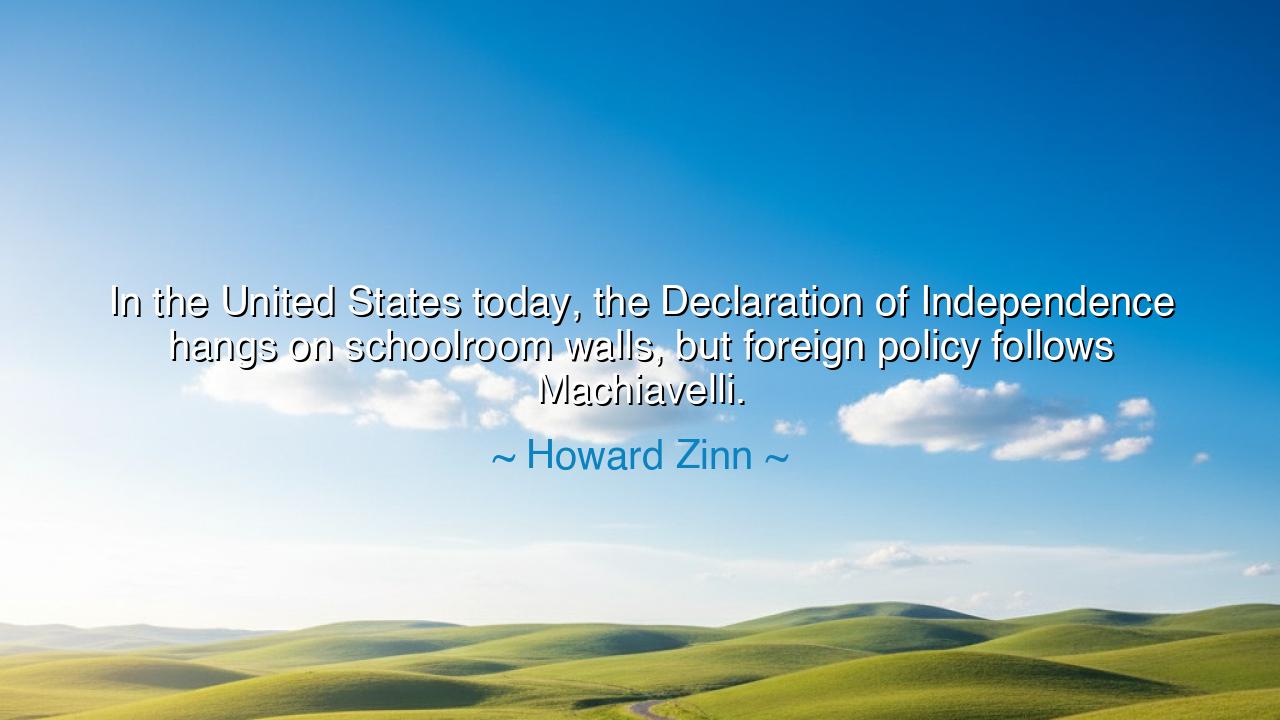
In the United States today, the Declaration of Independence hangs
In the United States today, the Declaration of Independence hangs on schoolroom walls, but foreign policy follows Machiavelli.






Hear now the words of Howard Zinn, historian of conscience and voice of the forgotten: “In the United States today, the Declaration of Independence hangs on schoolroom walls, but foreign policy follows Machiavelli.” In this single sentence, fierce as a blade and sorrowful as a prayer, he exposes the rift between ideal and reality, between the promise of liberty and the practice of power. Zinn, a man who chronicled not the triumphs of rulers but the struggles of the people, here speaks as a prophet mourning the hypocrisy of nations — the way lofty principles are taught to children even as they are betrayed by their elders. His words echo like thunder across centuries, reminding us that the greatest danger to a republic is not its enemies abroad, but the corruption of its soul within.
The Declaration of Independence, that sacred scroll of freedom, proclaims that all men are created equal, that they are endowed with rights that no king nor tyrant may take away. It is the nation’s covenant with its conscience, its scripture of liberty. Yet Zinn tells us that while this document is honored in word, it is forsaken in deed. On the walls of classrooms it glows like a relic, but in the chambers of power it lies forgotten. There, another book rules — the book of Machiavelli, the Florentine thinker who taught that the ends justify the means, that deceit and manipulation are the true instruments of statecraft. The contrast is not merely political; it is spiritual. The Declaration speaks to the soul, while Machiavelli speaks to the appetite for power.
Consider, my listener, how history bears witness to this truth. When the United States was born, it declared its independence from empire — yet in time, it became an empire itself. From the wars in Vietnam to the covert conflicts of the Cold War, from the whispers of diplomacy to the roar of missiles, foreign policy often spoke not the language of freedom, but of domination. Like Rome before it, the republic learned to speak softly of virtue while acting boldly for interest. The flag that once symbolized liberty to the oppressed became, for many, the standard of intervention and ambition. And yet, Zinn does not speak with hatred, but with grief — for he loves the promise of America too much to remain silent about its betrayal.
In the tale of Rome, there lies a mirror to our own age. Once a republic of laws and ideals, it fell into the hands of emperors who claimed necessity as their god. They said, “We must rule the world to preserve peace.” And so they conquered in the name of security, enslaved in the name of civilization, and glorified their violence as destiny. So too, Zinn warns, do modern nations cloak Machiavellian cunning in the garments of righteousness. They speak of spreading democracy while defending markets; they promise peace while preparing for perpetual war. This is the tragedy of civilization — when principle bows before power and men call it prudence.
Yet Zinn’s wisdom does not end in condemnation; it is a call to awakening. He asks each of us: Which document will you serve — the Declaration or the Prince? Will you live by the creed of equality and compassion, or by the cold calculations of self-interest? The choice is not only for governments, but for individuals. Every time we excuse injustice in the name of expedience, every time we value profit over people, we walk the path of Machiavelli. But when we act with integrity even when it costs us, when we speak truth against power, we restore the spirit of the Declaration of Independence.
The meaning of Zinn’s words is therefore both political and personal. He teaches that freedom is not a possession but a practice, not a birthright but a burden that must be carried with courage. To teach children of liberty while conducting foreign policy through deceit is to live in contradiction. But to live truthfully — to align one’s actions with one’s ideals — is the highest form of patriotism. The walls of the classroom must not be the tomb of the Declaration, but the cradle of its renewal.
So, my listener, let this be your inheritance: do not revere the words of freedom — live them. Question those who wield power without principle. Refuse to accept that morality and politics must be enemies. Let your life itself be a declaration of independence — from cynicism, from indifference, from the cold counsel of expedience. For nations, like men, are judged not by their promises but by their deeds. And as Howard Zinn teaches, only when our actions honor our ideals will peace cease to be temporary, and justice cease to be a dream.
Thus, remember this final truth: The Declaration of Independence was not written to hang on walls, but to live in hearts. Let it not be a memory recited by schoolchildren, but a commandment carried by the brave. For when principle rules policy, and compassion governs power, then at last the words of the founders will rise from parchment and breathe again — not as history, but as destiny.






AAdministratorAdministrator
Welcome, honored guests. Please leave a comment, we will respond soon